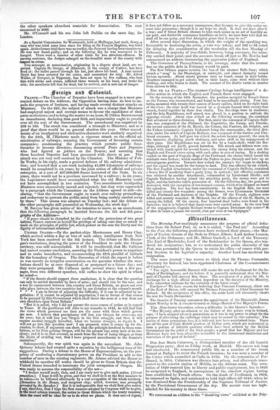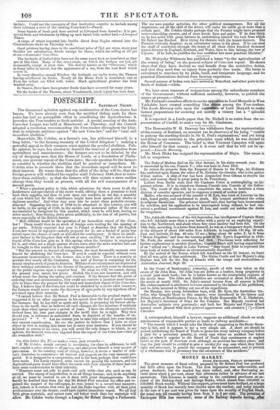.iniscellantous.
The Morning Post exultingly announces the progress of official defec- tions from Sir Robert Peel, or, as it is called, " the Peel rot." According to the Post, the following gentlemen have resigned their places,—the Mar- quis of Exeter, Groom of the Stole to Prince Albert; Lord Arthur Lennox, Clerk of the Ordnance; and Mr. Milnes Gaskell, a Lord of the Treasury. The Earl of Hardwicke, Lord of the Bedchamber to the Queen, also ten- dered his resignation; but, as we understand the polite obscurity of the Post, was persuaded by the Queen to retain his office—of course with per- fect freedom in his legislative capacity. Another Lord has tendered his resignation.
The same journal "has reason to think that Sir Thomas Fremantle, Secretary for Ireland, has been appointed Chairman of the Commissioners of Customs"— " The right honourable Baronet will vacate his seat in Parliament for the bo- rough of Buckingham; and we believe it is generally understood that the Mar- quis of Chandos will succeed him there. The acceptance of a place for life, in exchange for a high official station dependent on the duration of the Ministry, looks somewhat ominous for the certainty of the latter event."
Further—" We have reason for believing that Viscount Conrtenay, eldest son of the Earl of Devon, will succeed Sir Thomas Fremantle as Chief Secretary for Ireland. By the acceptance of this office, the noble Lord will necessarily vacate his seat for South Devonshire."
The Gazette of Tuesday announces the appointment of the Honourable James Stuart Wortley to be Alvocate-General or Judge-Martial of her Majesty% Forces. The Manchester Guardian solves a difficulty in the Queen's Speech-
" Her Majesty, after an allusion to the failure of the potato crop in Ireland, says, 'I have adopted all such precautions as it was in my power to adopt for the purpose of alleviating the sufferings which may be caused by this calamity.' The nature of those precautions has, it is believed, now been ascertained here. There are off the port of Cork 80,000 quarters of Indian corn, which are understood to ferret a portion of 100,000 quarters which have been ordered by the British Government for the relief of the Irish people; a proof that her Majesty and her Ministers have not been altogether insensible to the threatened destitution and starvation of the poor of Ireland."
Don Jose Maria Calatrava, a distinguished member of the old Spanish Progresista party, died on Friday week, at Madrid. His career was long and checkered. He commenced public life as a member of the Junta formed at Badajoz to resist the French invasion; he was next a member of the Cortes which assembled at Cadiz in 1810. On the restoration of Fer- dinand, in 1814, Calatrava was thrown into prison, and afterwards trans- ported to the convict station of Melilla, on the African coast. The revo- lution of 1820 restored him to liberty and public employment; but in 1823 he emigrated to England, in consequence of the absolute regime having been established by French efforts. On the death of Ferdinand, in 1834, he returned to Spam, and continued to hold high offices till 1843; when he was dismissed from the Presidentship of the Supreme Tribunal of Justice, by the Provisional Government of the day. His morals were too high- minded for his country in these times.
We recommend an addition to the "dissolving views" exhibited at the Poly-
technic. Could not the managers of that institution contrive to include among 'their tableaux a view of the existing Corn-laws ?—Punch.
Some barrels of fresh pork have arrived at Liverpool from America: it is pre- served fresh and wholesome by filling up each barrel with melted lard.—Liverpool Times.
A cargo of wheat imported into Dublin direct from Naples entered into the "Customhouse docks on Thursday week.
Good potatoes having risen to the exorbitant price of 714 per stone, many poor families are substituting Swede turnips for them; which are selling at 2d. per atone.—Lancaster Guardian.
The lowlands of Oxfordshire have not for some years been so inundated as they are at this time. Many of the cross-roads, on which the bridges are bud, are impassable, except at great risk. The district known as the "Ottmnors " which is many miles in extent, hsts the appearance of a sea, from the vast flood which -.covers it.
In every direction aromad Windsor the lowlands are under water, the Thames having overflowed its flanks. Nearly all the Home Park is inundated; and at Eton the cellars are filled with water. Much agricultural produce has been washed away.
In Sussex, there have been greater floods than have occurred for many years. On the banks of the Thames, about Wandsworth, much injury has been done.



























 Previous page
Previous page